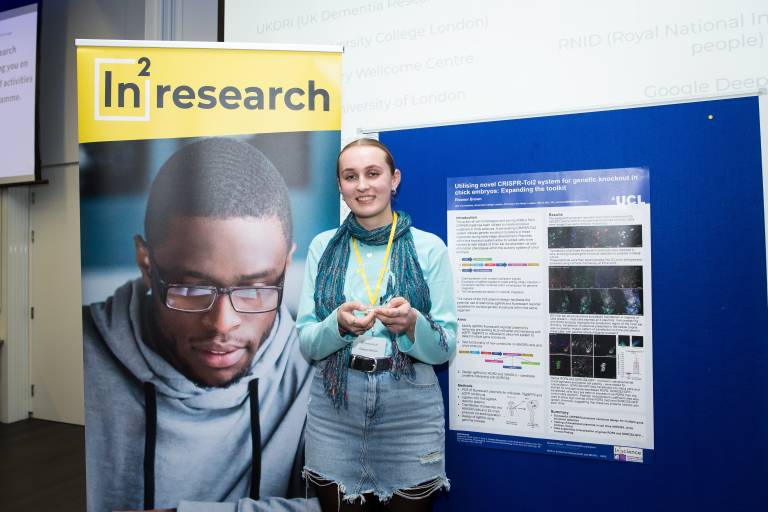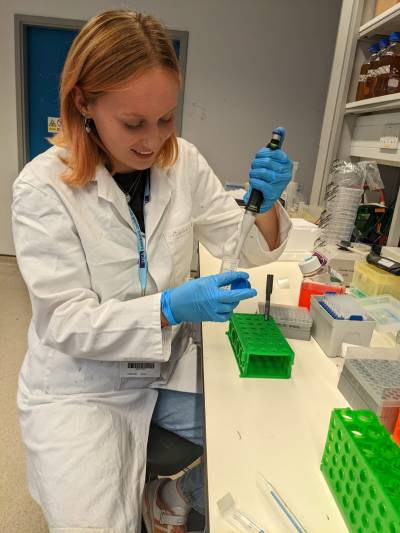Q&A with PhD student Eleanor Brown
23 October 2023
PhD student Eleanor Brown talks about her journey to UCL and gives an insight into life inside Dr Dan Jagger's Lab.

Tell us about your background - it would be great to find out more about your education/career so far
My journey into STEM first started after getting my GCSEs in 2017 back in Oxfordshire. At that point in time I was incredibly indecisive over which A-levels to pick. I had a great interest in design, which somehow developed into forensic science, and then further developed into a passion for literature. I think it is safe to say I have my family to thank when they suggested I chose Biology (“it always looks good to have a science subject!”) alongside English literature and philosophy & ethics.
In the end, I fell in love with Biology as a subject. It seemed to stimulate my brain the right way, and left me keen to delve further into the world of STEM.
I completed my A-levels - not well, mind you - and applied to study a BSc in Biology at the University of Kent in 2019. It was a great experience being down in the Garden of England. I feel that lab work came very naturallyto me and I definitely had a few moments of relief during my first year that I had made the right choice. The degree over the three years gave me a great and grand taste for the many avenues I could go into, and was particularly thankful to be able to work with Dr Emma Hargreaves during my final year project, titled ‘Investigating Cold Shock Proteins YBOX-1 and RTN3 During the Mammalian Cell Cold Shock Response’. In this molecular biology project I was able to get a good taste for what life in the wet lab would be like, and learned many techniques in the process. I received First-Class Honours in 2022.
I was then halted in my academic progression when I realised completing a Masters degree was not affordable. I started looking for jobs in science, and came across the opportunity to become a member of the facilities team for the University of Oxford’s Oncology department. I was able to get a great insight into the day-to-day runnings of research labs - and learn just how often pieces of equipment break! - whilst meeting some truly wonderful PhD students, postdocs and PIs. Many of them asked what my next step was in the world of STEM, and I would always answer with “I’d like to do a PhD, but…”.
I received the news that the PhD proposal Dr Dan Jagger at UCLs Ear Institute had given me the opportunity to apply for had received funding from the Royal National Institute for Deaf People (RNID) and the Anatomical Society (AS), and was over the moon. It is now coming up to the end of my first month here at the Ear Institute.
Can you tell us about your journey through the In2research programme? What is it and how did it help you?
In between the development in my education, I was introduced to the In2science programme (now known as the In2STEM programme) during my first year of A-levels. In2scienceUK is a charity and company that aims to broaden the pool of individuals entering a career in STEM, by providing young people from disadvantaged backgrounds the opportunity to gain experience in STEM research. Being from a non-fee paying, state-maintained secondary school, with neither of my parents having a higher education degree, I was eligible to join the summer 2018 cohort, where I was based with Dr Iulia Blesneac and Dr Aislin Sheldon at the Nuffield Department of Clinical Neuroscience, University of Oxford, for a 2-week lab placement. During my placement my intrigue and desire to pursue a career in research really developed - seeing and experiencing first hand what being in a real lab was like was huge, as before then I had only done practical work in the classroom.
I became alumni for the programme after this, and was told about their new programme, In2research, through their newsletter. In2research is a year-long placement for undergraduate students from low socioeconomic backgrounds to gain access to information regarding postgraduate degrees and careers. It currently provides placements in STEM, Arts & Humanities and Social Sciences, and is about to start its third year. I quite literally jumped at the opportunity to be involved in In2research following my previous experience with the programme.
It was unfortunately hindered by the pandemic, meaning that the 8-week programme was not being run. I remember joining their online talks every month from my bedroom via teams, and was hit with the consolation that I was still able to work towards my interests and career. I am extremely thankful that I had that in place during my second year.I was paired up with Gabrielle Sheehan from the Wellcome Centre for Human Neuroimaging, UCL, and was provided with valuable talks about what a postgraduate career looks like, and the process of searching and applying for them.
During the second year programme, I was contacted by a member of In2scienceUK asking if I was still interested in partaking in a placement, and I was super thankful to have been placed at the UCL Ear Institute with Dr Stephen Terry. I was given a mini-project to work on, using new scientific techniques and developing on those I'd learnt during my undergrad. At the end of my placement, I was given the opportunity to create a scientific poster of my work, and our cohort presented these in a symposium-style event. My poster, titled ‘Utilising novel CRISPR-Tol2 system for genetic knockout in chick embryos: Expanding the toolkit’ was awarded the style award for the presentation of my work. I believe I developed my skills a lot during this placement, and was welcomed warmly to the Ear Institute.
Why did you choose to apply to the UCL Ear Institute for your PhD?
After my experience at the Ear Institute last year, I was given the incredible opportunity to work on a PhD project proposed by Dr Dan Jagger. I had been welcomed so warmly by the members of the institute, and given a peek into the opportunities to learn within the division that it practically a no-brainer. The institute is an amalgamation of people from all different academic backgrounds coming together to create the largest research centre for hearing and deafness in Europe; I had no doubt that I would be allowed to flourish both personally and academically, and have been proven correct through the introduction to the great support system the Ear Institute provides during my studies.

Tell us a bit about the research work you’re doing now
My project aims to look into the mechanisms of hearing loss in NF2-related schwannomatosis (NF2). NF2 is an inherited autosomal dominant disorder that causes a truncated, abnormal form of tumour suppressor protein, Merlin, to be produced (if produced at all). NF2 cases are characterised by bilateral vestibular schwannomas that cause hearing loss, problems with balance and tinnitus. NF2 is a great area of research as there is currently no approved pharmacotherapies that target NF2 pathophysiology. Current treatments try to preserve hearing through surgery, radiotherapy and cochlear implants, though none are entirely effective, or universally applicable.
I aim to look into how the unpredictable nature of sensory loss occurs, using GM mice and archived samples from NF2 patients, to hopefully gain insight into the roles of Merlin in the ear, what its absence causes, and work on finding a therapeutic target for the disease in my work.
What have you most enjoyed about your time at UCL so far?
Coming from a campus university, I’m really enjoying the exploration aspect of UCL - being in the heart of the city provides me with excitement and intrigue, whilst also knowing that I can seek solitude from the bustling city within the walls of the Ear institute.
What are your future career goals?
It seems to be that my future career goals always end up being bigger and better than what I want them to be, but I would love to carry on into academia, potentially become a postdoc, but most importantly be able to carry on with lab work. As long as I am in sight of some form of equipment, I’ll be happy!
What advice would you give to other aspiring students considering studying at the UCL Ear Institute?
I think the most important thing aspiring students need is drive - as long as you have a desire to be somewhere, you are more likely going to be able to get there, and potentially in ways you cannot predict. Get networking, even if that means looking up people on LinkedIn, sending an email stating your interest in the work of a lab, or attending as many events as you physically can, you will be surprised at how many avenues it can lead you down. Also, get involved! If you have the chance to get connected with links like In2scienceUK, you will be set in good stead to progress into STEM, and potentially the Ear Institute if Audiology research is for you.
 Close
Close

